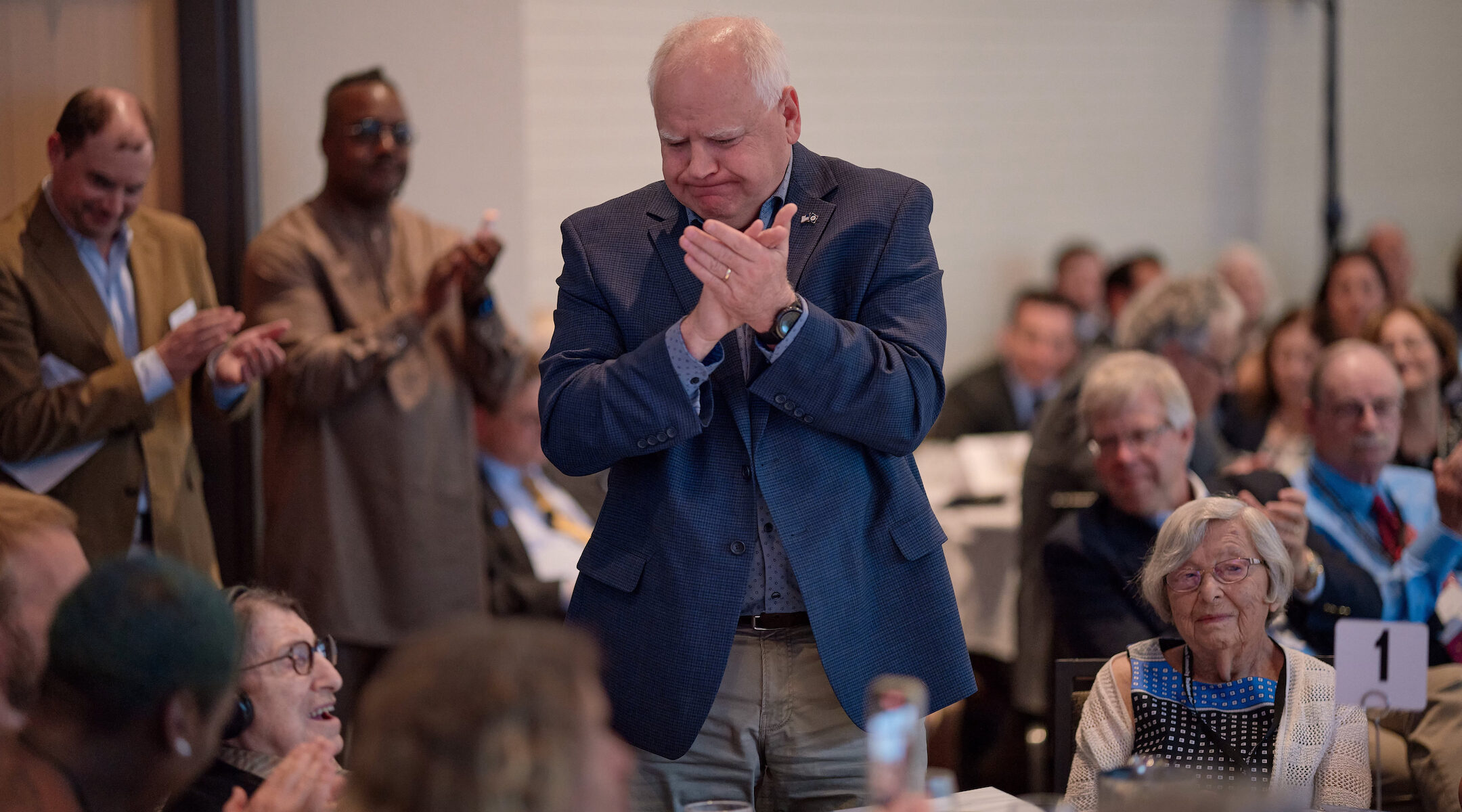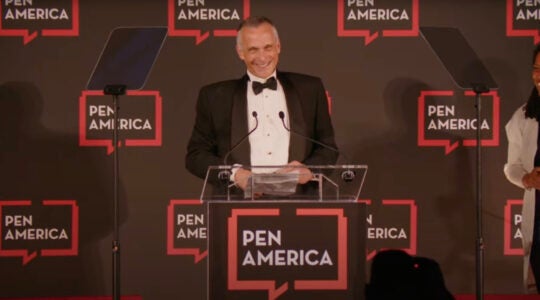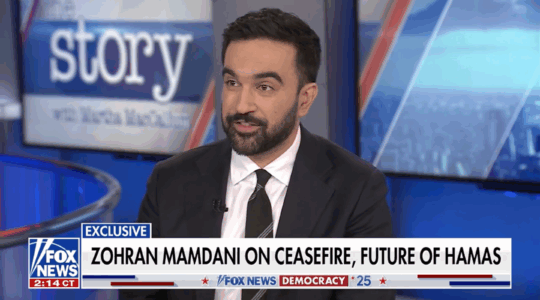In Judi Agustin’s freshman year at Mankato West High School, her teacher instructed her to wear a yellow star.
It was part of a Holocaust curriculum at the school, located in a remote area of Minnesota with barely any Jews. For a week, freshmen were asked to wear the yellow stars, which were reminiscent of the ones the Nazis made the Jews wear. Seniors played the part of the Gestapo, charged with persecuting the “Jews.”
Unlike everyone else in her class in the 2001-2002 school year, Agustin was Jewish. The experience “was incredibly hurtful and offensive and scary,” she recalled on Tuesday. Her father complained to the district, and wrote a letter to the local paper decrying the lesson.
In response, she recalled, a teacher intervened. That teacher, according to her recollection: current vice presidential nominee Tim Walz.
“When Tim Walz found out about it, he squashed it real quick, and as far as I understand they never did it again,” Agustin told the Jewish Telegraphic Agency. “So he was an advocate for my experience, as one of four Jewish kids in the entire school district. And I always felt like he had our back.”
A progressive favorite in Minnesota, where he is now governor, Walz is also heralded for his background as a public school educator. Lesser known is the fact that, while teaching in rural, largely white Midwestern school districts, Walz developed a particular interest in Holocaust and genocide education.
Walz is on the campaign trail this week with Vice President Kamala Harris, his running mate, and did not immediately respond to a request for comment. JTA could not independently verify that he was the teacher who stopped the Mankato West lesson.
But it’s clear that how to teach the Holocaust well has occupied Walz for decades. In 1993, while teaching in Nebraska, he was part of an inaugural conference of U.S. educators convened by the soon-to-open U.S. Holocaust Memorial Museum in Washington, D.C. Eight years later, after moving to Minnesota, he wrote a thesis arguing for changes in Holocaust education. And as governor, he backed a push to mandate teaching about the Holocaust in Minnesota schools.
Through it all, Walz modeled and argued for careful instruction that treated the Holocaust as one of multiple genocides worth understanding.
“Schools are teaching about the Jewish Holocaust, but the way it is traditionally being taught is not leading to increased knowledge of the causes of genocide in all parts of the world,” Walz wrote in his thesis, submitted in 2001.
The thesis was the culmination of Walz’s master’s degree focused on Holocaust and genocide education at Minnesota State University, Mankato, which he earned while teaching at Mankato West. His 27-page thesis, which JTA obtained, is titled “Improving Human Rights and Genocide Studies in the American High School Classroom.”
In it, Walz argues that the lessons of the “Jewish Holocaust” should be taught “in the greater context of human rights abuses,” rather than as a unique historical anomaly or as part of a larger unit on World War II. “To exclude other acts of genocide severely limited students’ ability to synthesize the lessons of the Holocaust and the ability to apply them elsewhere,” he wrote.
He then took a position that he noted was “controversial” among Holocaust scholars: that the Holocaust should not be taught as unique, but used to help students identify “clear patterns” with other historical genocides like the Armenian and Rwandan genocides.
Walz was describing, in effect, his own approach to teaching the Holocaust that he implemented in Alliance, Nebraska, years earlier. In the state’s remote northwest region, Walz asked his global geography class to study the common factors that linked the Holocaust to other historical genocides, including economic strife, totalitarian ideology and colonialism. The year was 1993. At year’s end, Walz and his class correctly predicted that Rwanda was most at risk of sliding into genocide.
“The Holocaust is taught too often purely as a historical event, an anomaly, a moment in time,” Walz Told the New York Times in 2008, reflecting on those Alliance lessons. “That relieves us of responsibility. Obviously, the mastermind was sociopathic, but on the scale for it to happen, there had to be a lot of people in the country who chose to go down that path.”
In his thesis, he noted that he intended to bring this curriculum to the Mankato school district as a “sample unit.” But another kind of lesson was unfolding there at the same time.
For years at Mankato West, high school students had been engaged in a peculiar lesson that was, all the same, not unusual for its time: In an effort to teach students who had never met a Jewish person what it might have been like to live under the Nazis, teachers had them role play.
For a week, freshmen wore the yellow stars, and seniors playing the Gestapo were given permission to torment them.
Such lessons had been going on since at least the 1990s, recalled Leah Solo, a Jewish student who graduated from Mankato West in 1998. For Solo, these lessons weren’t so bad.
“People knew I was Jewish, people knew to be sensitive around me,” Solo told JTA. Her teacher, who was not Walz and whom she liked, “was doing his best to try to teach a really hard subject to folks who had no idea. Most of these kids had never met a Jew before.” In her senior year she was given the choice of whether she wanted to play a Nazi or another kind of role, and chose the latter.
Things were different by the time Agustin took the class several years later. By then, the Holocaust role-playing wasn’t just limited to the confines of the classroom.
“They could come up to you in the lunchroom,” recalled Anne Heintz, a fellow student at the time. Local students whispered about the lesson before they got to high school, she said.
One senior, in Agustin’s recollection, got violent and started shoving the “Jewish” freshmen into lockers.
Outraged, her father wrote a letter to the local newspaper, and some parents complained to the school district. Agustin left the high school after her sophomore year. None of this happened in Walz’s classroom, according to the students, and Heintz recalled that the lessons had ended by the time she graduated in 2004.
“I’m not sure what his involvement was. I know it just ended,” Heintz, who is not Jewish, told JTA. “He was teaching at the time it ended.”
JTA could not verify whether Walz knew about the lessons, which had been going on for years, before they were stopped. A spokesperson for the high school told JTA they “don’t have any information” on the details of the lessons, but noted, “When Governor Walz was at Mankato West High School he was primarily a Global Geography Teacher and Football Coach. Subjects such as the Holocaust were taught in history courses.”
Agustin’s father, Stewart Ross, told JTA that he did not recall Walz being involved. Neither did Bob Ihrig, one of the teachers who taught the lesson as part of a World War II unit. He said it continued in a limited, classroom-only version until his retirement in 2014.
Ross, Ihrig and all three Mankato West High students spoke highly of Walz as a teacher and community leader, though only one, Heintz, actually had him in the classroom.
“What I remember most is, he always made all the subjects that we talked about super engaging,” she said. “It always seemed like he was able to make a subject really exciting for folks and really engage everyone in class. And I think that is part of how he speaks now that he’s on a national stage as well.”
Solo, who had Walz’s wife Gwen for a different class, took a student trip led by the couple to China, where Tim Walz taught for a year early in his career. She recalled how, in 2004, Walz stood up for her when she was working with John Kerry’s presidential campaign and security for a George W. Bush rally tried to boot them from the premises.
“When security also tried to kick him out, he was like, ‘I am a former Teacher of the Year who just returned from being deployed. I don’t think you want to kick me out,’” Solo recalled, describing an incident that made local news at the time. “And then after the rally, he came and signed up to volunteer with the Kerry campaign, because he did not appreciate that.”
Volunteering with Kerry’s campaign led directly to Walz’s entrance into politics. Solo would go on to work for Walz’s congressional campaigns.
Walz stuck with teaching as he began his political career; when he was elected to represent Mankato in 2006, he was the only active educator in Congress.
Last year, as Minnesota’s governor, Walz returned to Holocaust education, and supported and signed a law requiring the state’s middle and high schools to teach about the Holocaust. The law, initiated and championed by the Jewish Community Relations Council of Minnesota and the Dakotas, also encourages schools to teach about other genocides. A working group for the curriculum hit snags earlier this summer when a pro-Palestinian activist was removed from the committee amid debates on whether Israel’s conduct in Gaza constitutes genocide.
The mandate is still anticipated to go into effect in the 2025-2026 school year. “This is going to work out, this is going to be good, because the governor and his staff are highly attuned to the concerns and sensitivities of the Jewish community,” Ethan Roberts, the JCRC’s deputy executive director, told JTA.
Speaking at a JCRC event in June, Walz said he had been “privileged and proud” to have participated in the U.S. Holocaust Memorial Museum training early in his career. But he said more needed to be done, and he emphasized that the curriculum chosen to accomplish the requirement would determine its success.
“We need to do better on Holocaust education. We need to do better on ethnic studies,” he told the crowd. “And I tell you this as a teacher and as governor, too, we don’t need test scores or anything to tell us that we’re failing.”
It was the kind of message that former Mankato West students said they came to expect from him.
“He is what you hope a great teacher is,” said Solo, “which is someone who’s not only teaching, but also learning at all times.”
With additional reporting by Jackie Hajdenberg.
Correction and updates (Aug. 8): This story has been corrected to remove a reference to Tim Walz as department chair. It has also been updated to reflect additional sources about Holocaust instruction at Mankato West High School.
JTA has documented Jewish history in real-time for over a century. Keep our journalism strong by joining us in supporting independent, award-winning reporting.






